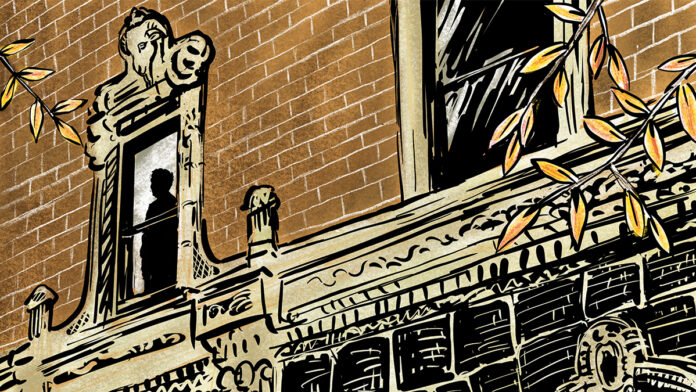
Finding an apartment in Chicago is a difficult, stressful, time-consuming process—especially for low-income families and individuals. But, sometimes, keeping an apartment can be just as cumbersome.
The recent foreclosure of the Leland, a single-room occupancy (SRO) apartment building with almost 140 units in Uptown, has left residents and other community members scrambling to protect one of the few remaining affordable housing options in the neighborhood.
“I’m worried I’ll be homeless,” says one resident, Stephan, who asked only to be identified by his first name to protect his privacy. “I’m on a limited income. This is perfect for me,” he tells the Reader of the room he’s been renting for almost a decade.
Single-room occupancy apartments like the Leland feature smaller, more affordable units for low-income individuals, such as those relying on supplemental security income (SSI). Heartland Housing, a subsidiary of social services nonprofit Heartland Alliance, owned and operated the property until it was placed into receivership last year amid building code concerns and Heartland’s financial turmoil. The receiver, a court-appointed body, is tasked with managing the property in the time between owners.
In January, Mercy Loan Fund—a Denver-based nonprofit housing developer that claims to have preserved over 46,000 affordable housing units across the country—filed a foreclosure suit in the Circuit Court of Cook County against owners of the Leland. Mercy is now seeking the property to be sold by a Chicago foreclosure service.
Court records show that, in 2015, Mercy assumed control of a loan worth about $2 million that the building owners had taken out as part of a 2004 redevelopment. Mercy named a number of entities associated with the building in the lawsuit, including the City of Chicago and the Illinois Housing Development Authority (IHDA)—both of which gave Heartland money to finance the 2004 redevelopment.
Read more: Heartland Alliance to spin off subsidiaries, dissolve
Now, amid foreclosure hearings, residents of the Leland are concerned a for-profit developer may purchase the building and kick tenants out of the only place they can afford to live. Affordable housing units are kept at rates that would allow people living on government income to rent them out, and developers of the buildings receive a tax credit for up to 30 years after financing.

Mercy, which owns or manages a number of properties in Illinois, noted in a September court filing that it and the City of Chicago had “met with and/or discussed the preservation of the property with over 30 different potential new owners,” but because of “extreme needs at the property, none of these potential owners have been willing to take over the property.” City of Chicago inspection records show a growing list of code violations for the building, mostly elevator-related.
But residents of the Leland—which was constructed 75 years ago—say it’s in OK condition. It’s similar to any other large apartment you might find in the neighborhood, with bricks that bare their history and stone spires atop a pair of the building’s corners.
Stephan says it’s maybe the only place he can afford in his neighborhood. “Uptown is getting gentrified,” he says. “I just don’t want a for-profit to come in and make apartments or condos.”
His concerns go beyond whether he will have a place to stay. He says social workers employed by Heartland Alliance regularly visited the building to work with residents until the COVID-19 pandemic began in 2020. Since then, those offices have been empty. “I’d go down there and talk about whatever bullshit,” he says. “It was really nice.”
Sue Gries, a housing team member with community group One Northside, explained the situation bluntly during a July rally at the corner of Leland and Racine. “The Leland is in danger of being bought up by a for-profit developer who will make more luxury microunits unless a nonprofit developer is able to put together the funding to keep this building affordable,” she said. “That’s why we’re taking action.”
Gries said the Chicago Department of Housing and the IHDA, which uses public dollars to finance and maintain the state’s affordable housing stock, had “been supportive” by responding to the group’s inquiries but that those who are concerned “must keep up the pressure. We cannot afford to lose a single unit of affordable housing.”

Andrew Field, the IHDA’s deputy director of communications, relayed that a majority of former Heartland Housing properties have remained affordable. “To date, ownership of 13 of the 14 properties have either been transferred or are in the process of being transferred to new owners who will maintain the affordability of the properties and not evict the tenants,” Field wrote in a statement to the Reader. “Regarding the Leland Apartments, all agencies continue to work with the owner to ensure the property stays open and affordable for its residents.”
Lee Byrd, a tenant representative with the affordable housing organization Voice of the People in Uptown, explained that more affordable housing is needed in Chicago, not less. “This is what you need and deserve in Uptown, in all communities: housing opportunities that never expire,” Byrd said, before asking the city and state “to commit the resources necessary to fund development without displacement.”
Jeff Martin, another resident of the Leland, survived a “massive stroke” in 2018 that caused him to lose his apartment and live in a nursing home until he found Heartland Alliance through his Medicaid provider. Heartland placed him at the Leland a few years ago.
“I consider myself at home in the building,” he says, lamenting how difficult it is to find affordable housing. “Affordable units are in high demand and short supply, I already pay over half my income for rent.”
At a court hearing on October 28, he relayed the fears he and his neighbors share.
“Many of us have experienced homelessness and the thought of facing that again is frightening,” Martin said. “Losing this building will only add to the homelessness crisis here in Uptown.”






